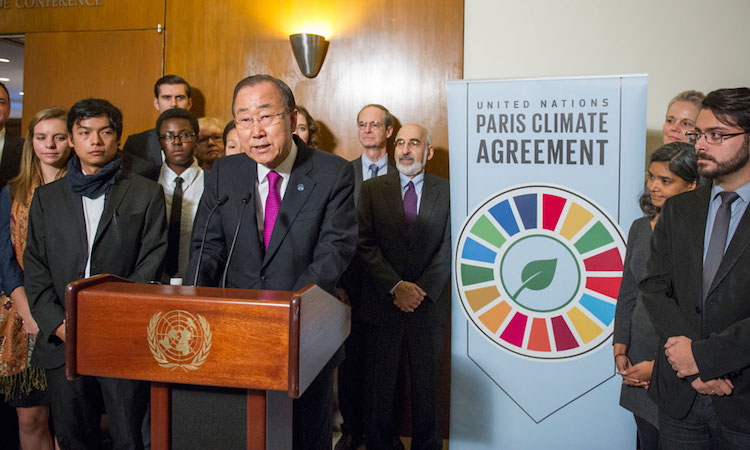By J Nastranis
NEW YORK (IDN) – Less than two months before UN Secretary-General Ban Ki-moon concludes his second term, he has described the entry into force of the Paris Agreement on climate change on November 4 “an emotional moment” for him, “a credit” to all civil society organizations (CSOs), and “historic for the world”.
He praised CSOs for their leadership, commitment and engagement, inviting them to “work together to make this world better for all”. In rather impassioned remarks, he said: “Today we celebrate, reflect and give thanks. I am deeply grateful to all of you and your organizations – representing millions of people. At a time when civil society is under attack in so many parts of the world, you have shown that citizens’ groups are essential partners for progress.”
Ban repeatedly thanked CSOs for their “vision, courage, persistence and leadership” that made November 4 happen, recalling that many of them joined him on that journey.
“I attended every UN climate change conference. I travelled from Antarctica to the Arctic to many climate flashpoints in between. I met many vulnerable people. I will never forget the children who were scared. And I will always remember the powerful voices from civil society,” Ban recalled.
In fact, he added, he had marched shoulder-to-shoulder with CSOs in September 2014 when he convened the Climate Summit. Millions of others held climate marches around the world.
“Your voices at the time were clearly heard by the leaders who attended the climate meeting,” he told the CSO representatives. “You showed the climate challenge stakes – and the solutions. You mobilized hundreds of millions of people for the cause.”
And yet there was no reason to rest on those achievements. “We are still in a race against time. We need to transition to a low-emissions and climate-resilient future,” said Ban, asking each and every one of the CSO representatives to keep up the fight. “Hold governments accountable and press for action.”
He added: “I would like to hear about your advocacy, activities and other efforts to contribute to the Paris Agreement’s objectives. Please share your concerns and vision for the future. Tell me what you think is most important for the United Nations and the global community to prioritize going forward.
Earlier he told the press at the UN Headquarters in New York that November 4 was a day to “make history in humankind’s efforts to combat climate change”.
That is a momentous day and he had chosen to mark it by meeting with representatives of civil society. He had invited them to thank them for their outstanding contributions and to ask how they were putting the Paris Agreement into action. “I look forward to hearing their concerns, their ideas and their plans,” Ban said.
“Over the past decade, we forged a great global coalition for climate action. Government officials, scientists, faith leaders, business executives and civil society activists around the world recognized that the future of people and planet was at stake. They made today possible.”
The outgoing Secretary-General said that with each new ratification, the reach of the Paris Agreement was growing. Just that week, Gabon, Indonesia, the Republic of Korea, Saudi Arabia, Sao Tome and Principe, South Africa and Viet Nam joined, which made almost 100 countries, accounting for 70% of greenhouse gas emissions, accounted together.
Referring to the Conference of the Parties, COP 22, kicking off on November 7 in Marrakech, Morocco, he said: “Our challenge is to sustain the momentum that has propelled the Agreement into force.”
“We remain in a race against time. But with the Paris Agreement and the 2030 Agenda for Sustainable Development, the world has the plans we need to make the shift to a low-emission, climate-resilient path. Now is the time to strengthen global resolve, do what science demands and seize the opportunity to build a safer, more sustainable world for all.”
Ban declared: “We are the first generation to really feel the effects of climate change – and the last that can prevent its worst consequences. Today shows us what is possible when we join forces for our common future.”
The discussion with the civil society was moderated by David Nabarro, Special Adviser on 2030 Agenda for Sustainable Development, and attended by a number of representatives of civil society groups from all over the world.
Participating in the event were: Keya Chatterjee, Executive Director, US Climate Action Network (on behalf of CAN-International); Angie Fyfe, Executive Director USA, ICLEI – Local Governments for Sustainability; and Naomi Ages, Climate Liability Campaigner, Greenpeace.
Pre-recorded video messages were also delivered by: Sharan Burrow, General Secretary, International Trade Union Confederation (ITUC); Alina Saba, Researcher, Mugal Indigenous Women’s Upliftment Institute, Nepal & Asia Pacific Forum on Women, Law and Development; Winnie Byanyima, Executive Director, Oxfam International; and Kathy Jetnil-Kijiner, Instructor, College of the Marshall Islands & Co-Director, Jo-Jikum.
Adopted by 196 parties to the UN Framework Convention on Climate Change (UNFCCC) in December 2015 in Paris, the Agreement’s central aim is to strengthen the global response to the threat of climate change by keeping the global temperature rise this century well below 2 degrees Celsius above pre-industrial levels and to pursue efforts to limit it to 1.5 degrees Celsius. [IDN-InDepthNews – 04 November 2016]
Photo: Secretary-General Ban Ki-moon speaks to journalists on the entry into force of the Paris Agreement on climate change. UN Photo/Rick Bajornas
IDN is flagship agency of the International Press Syndicate.

